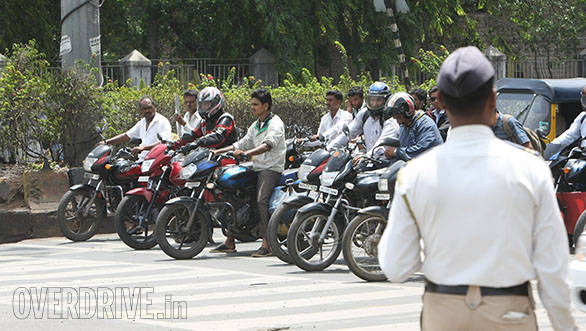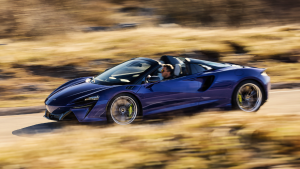The sham(e) that is the Indian licensing system
My brother is at that age where one seeks approval from the government to be able and capable to safely pilot a motor vehicle. Going by experience, it wasn't going to be a very difficult exam. When I passed mine nearly a decade back, I discovered that the process involved being able to ride in a tight figure of eight without putting your feet down. To make it a little more challenging the folks at the RTO decided to fill this tiny track with a thick layer of gravel. New riders are naturally apprehensive of taking tight turns, doing so in gravel would be a true and comprehensive test of talent, it would seem. Granted this is far from the knowledge and general sense that one would expect from a new road user but the RTO believes this system is apt and that's just the way it is.
In the lead up to his test date, my brother was naturally quite excited and a fair bit nervous. He found himself a thoroughly gravelly patch of tarmac and began to literally ride himself around in circles. When the big day arrived, he arrived at the test track wide eyed and raring to go. But then something unusual happened. The RTO examiner, glanced up from his clipboard and sized up the lanky, eager young man standing before him, helmet on, jacket zipped up and gloves firmly fastened. After a long and intense stare, the man, a clear master at judging character grunted and scribbled something on his sheaf of papers. And that was that. My brother had 'passed' and was a proud owner-to-be of a valid Indian motorcycle rider's licence. Naturally, he was a bit disappointed with the way things went, but like his friends put it, hey, he's got his licence right, so why worry.

But let me tell you, we need to worry. Hell we need to worry a lot. This is the very reason we have one of the highest traffic-related death rates in the world. We simply don't know any better. Ignorance isn't just bliss, on the road it can be lethal. It's easy to get irritated with other users who don't follow lane discipline, stop before a zebra crossing, or safely pull over off the road or. . . this could go on for a while. But the fact of the matter is that they simply don't know any better (Check right useage of hazard lamps).
Sure the situation can be considerably improved with more enforcement but there are a few problems with that theory. One is that we simply don't have the manpower - a 2013 survey showed that there was just one cop in Mumbai for approximately 760 civilians. And that's in one of the biggest cities with the most hard working police force in the country. Most other places are worse off. It's not possible to exercise much control like that now, is it? Especially when you consider what a propensity we Indians have to (proudly) find ways to get around rules and regulations. I recently saw a meme that summed up the situation. It was an explanation of how traffic signals in India really work. Green means 'go', amber means 'go go go!' and red means 'look for mamu and then go'. That's pretty funny but after a chuckle, you realise just how painful the truth is.
So what's the solution then? Call me a pessimist but I simply don't think there is one, at least not one in the short run. Enforcement levels definitely have to improve (and fast) but the sheer number of road users and the general 'chalta hai' attitude means it won't be highly effective. There are two courses of action that I see as workable. The short term solution is to fine the infringers and fine them hard. The average official traffic violation fine in Mumbai is between Rs 100 and 300. This simply isn't enough. We need the fine to hurt, hurt so bad that the average idiot will think twice the next time he jumps a signal to save fifteen seconds. Delhi and its surroundings have started doing this and Mumbai needs to too.
Of course, there's the problem of keeping bribe happy cops out of the situation. As Shumi suggests, why not simply take cash out of the equation? The offending motorist simply gets a challan that has to be paid online. Almost everyone has a smartphone and online transactions are accessible to most. For those who can't, the fine can simply be paid at your local RTO or bank. Don't pay in time? Well, then you lose your licence. There are multiple possibilities and I'm just thinking off the top of my head. The fact of the matter is that something has to happen.
The natural solution to the problem of manpower is letting machines do the job. A more sophisticated surveillance system (most major junctions already have cameras) that picks up violations and sends the fines straight to the law breaker's homes would be effective. I'm aware that this is not a cheap system to set up but it will easily make up for the cost of investment once the revenue starts flowing in. In fact, the fining system is a win win. More money for the police department and more safety on the road.
The long term solution though is the one that will fix the problem entirely. We need to make sure our prospective road users know their stuff before handing them a potential killing murder weapon in the form of a plastic card. Make sure that they know their theory, that they understand the rules of the road, and more importantly, why these rules exist. And that can only happen at the very beginning through a stringent examining system. It's this education that is the only way we can wake up from the nightmare that is the Indian driving environment. And that is why I honestly don't see any drastic changes in how things work on our roads for the next few years. Well, at least, not immediately and definitely not until we get plenty of new drivers to pass their licence tests the right way and this next generation of educated and aware drivers start using our roads in big numbers. But till then, I'll just keep my eyes peeled and hands firmly on the wheel.
PS: It's great timing that, just a day after this column was written, we have word of a new, stricter MV act that is to be presented later this year. We hope it brings in the change that is desperately needed on our roads.














